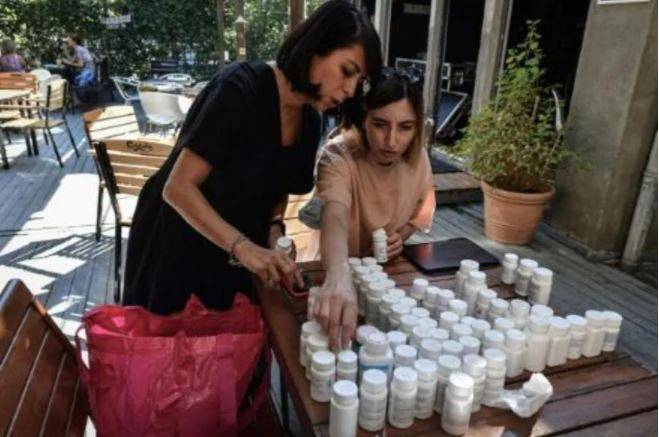In a street in Bucharest, drug addicts gather around an ambulance to collect rare syringes. While attention is focused on the COVID-19 pandemic, the war against HIV is slowing and AIDS is advancing covertly in Eastern Europe. Alina Shiao, from the Romanian AIDS Association, tours sensitive neighborhoods in Bucharest three times a week to assist at-risk individuals and provide them with sterile equipment to avoid the risk of infection. However, the stock has begun to run low, and the rounds are getting shorter. Due to a lack of public funding amidst all efforts concentrated on combating the coronavirus, the ambulance may have to remain in the garage after a month, according to Shiao.
Her colleague Ada Luca, frustrated by the government's inaction on this issue, asks, "What costs less? Buying a syringe or treating a patient for life?" Even before the health crisis, the countries of the former communist bloc were among the most affected in this regard: in 2019, Eastern Europe accounted for 76% of the diagnosed AIDS cases in the continent, according to the European Centre for Disease Prevention and Control. The COVID-19 outbreak has exacerbated an already complicated situation.
### Significant Decrease in Testing
Dafron Mokhmediev, the coordinator of the Red Cross in Europe, explained to AFP that "in addition to the stigma that people living with HIV still face in many countries, the pandemic has added new challenges." With hospitals closed to non-COVID patients, lockdown measures, and travel restrictions, "access to testing and diagnosis services has been restricted," according to Mokhmediev.
According to the Joint United Nations Programme on HIV/AIDS, there were 140,000 new HIV infections reported in Eastern Europe and Central Asia in 2020, down from 170,000 in 2019. This decrease does not indicate a change in the prevailing trend but reflects a "sudden" slowdown in testing, according to this UN agency. Romania, with a population of 19 million and about 17,000 residents living with HIV, saw a one-third reduction in testing last year. The same situation is evident in neighboring Bulgaria, where Alexander Milanov from the National Patients' Organization regrets that "regional health centers were overwhelmed with COVID-19 tests and hardly conducted any testing for HIV."
### Disrupted Supply Chains
The pandemic also complicated patients' access to medications by disrupting logistics supply chains, according to Mokhmediev. This presents an additional challenge for Romanians living with AIDS, with hospitals often finding themselves without treatments in a country where the health budget is considered the lowest in the EU.
Alexandru Tantu, a 28-year-old IT expert living with HIV in Bucharest, believes the argument of lacking resources is "weak." He told AFP, "We are angry because we feel abandoned," referring to patients who could face "irreparable consequences" due to a lack or delay in treatment. The Romanian Ministry of Health did not respond to AFP's inquiries, but doctors have reported waiting for the first tranche of funds after the government agreed to extend the budget.
While Alexandru considers himself "lucky" to have a stable job, he reveals he receives calls from patients "thinking about suicide." He criticizes the state for not acknowledging its "historical responsibility," while most AIDS-related deaths are attributed to it. Approximately 11,000 children born during the 1980s under Nicolae Ceaușescu's regime, which encouraged large births, contracted AIDS due to the use of unsterilized injections in hospitals or orphanages. At that time, the disease was perceived as affecting only the "corrupt West."
### Constant Fear
Alina Dumitriu, director of the NGO "SENS Positive," has witnessed periods of shortages in antiretroviral treatments but thought those days were over. Amid calls and text messages from desperate patients, Alina sorts the medications arriving from donors abroad to send to people who rely on them for survival, with an estimated number of dozens each week. She sometimes supplies hospitals that "had to cut the AIDS patients’ budget to cope with the influx of severe COVID cases."
Although new treatments prolong the lives of those living with AIDS, "these patients still live in constant fear and do not know if they will find their medication the next day," according to Dumitriu.




